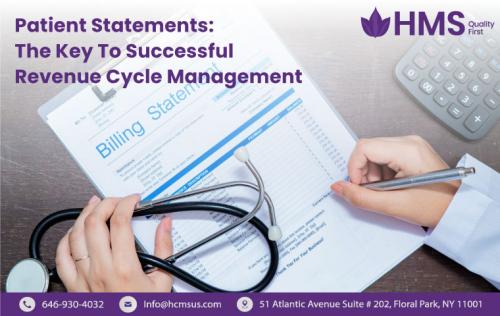Patient Statements: The Key To Successful Revenue Cycle Management

Healthcare providers are well-aware of the importance of a successful revenue cycle management (RCM) system. However, many providers struggle to optimize their RCM processes, in part because they do not have access to the right data. In particular, accurate and up-to-date patient statements are essential for a successful RCM process. This article discusses the role of patient statements in RCM and provides tips for optimizing your patient statement processes.
What Are Patient Statements And Why Are They Important For RCM
Patient statements are documents that provide a summary of healthcare services rendered to a patient and the corresponding charges. They are an important part of RCM because they allow providers to track payments and identify patients who may owe money for services. In addition, patient statements can help providers identify billing errors and correct them quickly.
There are several ways to optimize patient statement processes, including:
1. Sending statements promptly
Statements should be sent to patients as soon as possible after services are rendered. This allows patients to review their statements and contact the provider if there are any questions or concerns.
2. Making statements easy to read
Statements should be clear and concise, with easy-to-understand information about charges and payments.
3. Offering payment options
Providers should offer a variety of payment options, including online payments, phone payments, and mail-in payments. This makes it easier for patients to pay their bills quickly and avoid late fees.
4. Tracking payments
Providers should track all payments made by patients, both online and offline. This helps providers keep track of outstanding balances and ensure that no payments are missed.
How To Create Accurate And Up-To-Date Patient Statements
One of the key factors in ensuring a successful revenue cycle management (RCM) process is having accurate and up-to-date patient statements. Patient statements provide providers with important information about patients' accounts, including past balances, payments, and current balances. In order to create accurate patient statements, providers need access to accurate and up-to-date information about patients' account statuses, payments, and other relevant data.
There are several ways that providers can obtain this information. One way is to use a healthcare revenue cycle management (HCRM) system that integrates with the provider's electronic health record (EHR) system. This will allow the HCRM system to automatically pull patient account data from the EHR system. Another way to obtain accurate patient statement information is by using a third-party billing service. This type of service will collect payment information from insurance companies and other payers and then pass it on to the provider.
Once providers have access to accurate patient statement data, there are several steps that they can take to optimize their patient statement processes. One step is to develop a process for regularly updating patient statement information. This can be done by setting up automated updates from the EHR or billing service, or by manually updating the information on a regular basis. Another step is to design an effective patient statement template that provides patients with clear and concise information about their account status.
Finally, providers should make sure that their staff is properly trained on how to use the patient statement template and update patient statement information. Staff should be able to accurately compile patient statement data and provide patients with clear instructions on how to pay their bills. By following these tips, providers can create accurate and up-to-date patient statements that will help them optimize their RCM processes.
Tips For Optimizing Your Patient Statement Processes
There are a few key things healthcare providers can do to optimize their patient statement processes:
1. Make sure your patient statements are accurate and up-to-date
This means ensuring that all information on the statement is correct, including patient name, account number, balance due, and payment history.
2. Use clear and concise language in your statements
Patients should be able to easily understand what they need to do in order to pay their bills.
3. Make it easy for patients to pay their bills
Include payment instructions on the statement, as well as convenient payment methods (e.g., online payment, phone payments, etc.).
4. Send statements promptly
It is important to send statements as soon as possible after the billing cycle ends, so patients have enough time to make payments.
5. Track payments and follow up with patients who have not paid their bills
Keep track of which patients have and have not paid their bills, and reach out to those who have not paid in order to collect payment.
The Benefits Of A Successful Rcm System
A successful RCM system can bring a number of benefits to healthcare providers, including:
Increased collections: A well-functioning RCM system can help providers to increase their collections by ensuring that bills are accurately billed and payments are collected in a timely manner.
Improved cash flow: By collecting payments sooner, a successful RCM system can help to improve a provider's cash flow. This can provide the financial stability needed to maintain and grow a healthcare organization.
Reduced administrative costs: A successful RCM system can help to reduce a provider's administrative costs by automating many of the billing and payment processes.
All of these benefits can be crucial for the success of a healthcare organization.
Conclusion
As you can see, patient statements play a vital role in successful revenue cycle management. If you want to optimize your RCM process, it is essential to ensure that your patient statements are accurate and up-to-date. By following the tips outlined in this article, you can make sure that your patient statements are helping you, not hindering you, in your quest for RCM success.
HMS is a full-service medical billing company that brings quality, experience, and resources in one place to grow your practice's profitability. Our complete medical billing assists healthcare providers in ensuring quality care services.
Keep your billing process accurate, secure, and fast with HMS-tailored medical billing services to uplift your practice revenue and profitability.
Post Your Ad Here
Comments